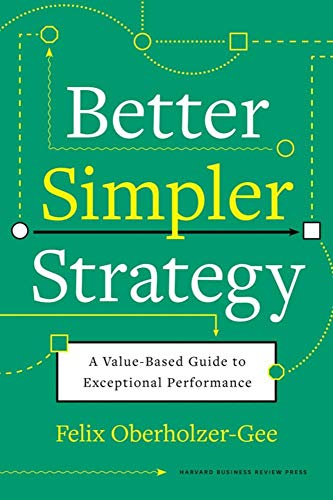



Harvard Business Review Press Better, Simpler Strategy: A Value-Based Guide to Exceptional Performance
A**R
Willingness to Pay and Willingness to Sell is the framework in this book
More focused on business that sell products/services than on Better Simpler Strategy
E**R
Great insight into the "Value-Based Approach"
A valuable angle on how to think business strategy. Thanks for your great work Mr. Oberholzer-Gee!
K**L
Strategy is Simple!
Prof. Felix is outstanding in explaining strategy so simply. Strategy is simple, hope is not a strategy.Demystify Strategy with Prof. Felix!
V**G
Simple but not simplistic. Read, linger, learn.
If there is one ‘business’ book you should read this year - or perhaps for the next ten years - it should be this one.Part of my job requires reading and reviewing 2-4 books and papers a week. Most business books tend to be merely a collection of success stories cherry-picked to prove a thesis. Few deal with the actual challenges of implementation: working with systems, people, and the realities of context, history, and trade-offs. The papers that offer nuance tend to be academic papers that few have the patience to read.This book deftly manages to sidestep all that. The ideas it presents are simple but not simplistic. The questions it raises challenge its own propositions; the conclusions often counterintuitive and therefore insightful. There are examples of firms that succeeded, firms that failed, and what we can learn from such systematic ('general equilibrium') thinking. Entire chapters on trade-offs and execution issues bring it back to experiences of leaders and managers in the real world. It is a book that challenges you with the highest of ideals, and yet offers practical suggestions for concrete next steps.This is, of course, not just because the author Felix Oberholzer is an award-winning teacher - he's earned some of the highest teaching awards granted by Wharton and Harvard - whose research has been published in the very best academic journals in multiple fields. Those are outcomes. It is because the author is a Renaissance man and humanist in the highest sense: he brings insatiable curiosity and a sharp mind, asking questions about what seems obvious, deriving new insights and making new connections. Not just about abstract concepts in economics and management - but about how it plays out in the real world. The chapter on complementors alone - drawing from economic thinking about substitutes and complements - can be the subject for an entire semester's course. Have many people asked the question of "why supply chains are people too"? How many business book chapters start with the link between Lady Gaga and Lipitor?I particularly adored several chapters pushing the reader to think about what NOT to do, and where firms should UNDER-invest. While startups often face natural constraints and make decisions about trade-offs, larger companies tend to want to try to do everything - or at least be good at everything you put up on Post-It notes during 'annual brainstorming sessions.' But what would truly add value to customers, suppliers, employees? And what should be deprioritized?I am torn between writing even more about this book, and leaving you to be delighted with its insights as you read through it yourself.I cannot recommend this book highly enough. It is not just about 'business and strategy.' It is a compass, a Socratic gadfly that will prompt you to ask questions about what 'adding value' means, whether it be for work, your personal life, or anything in between. Read it. Linger. Reread it. Learn.
T**T
Great as a text book or business book
Better Simpler Strategy is a terrific book. It describes how a variety of companies can simplify the design of their corporate strategies by focusing on value levers that impact willingness-to-pay (or -to-sell). The book offers many examples and is quick to the punchline with the insights; it is neither dense nor verbose and long-winding. I am sure the book will have a tremendous impact in corporate boardrooms and among senior executives who take time to distill its principles. I think it can be read in a course on strategy, substituting long and dense textbooks or for business people to learn and apply the frameworks.On the desirable side, a few in-depth examples of applications in companies (as opposed to post-hoc retrofitting of the framework to explain success) would have made the book even better. In my experience, application of even the most solid business frameworks is an art and typical pitfalls are common.
Trustpilot
5 days ago
1 month ago